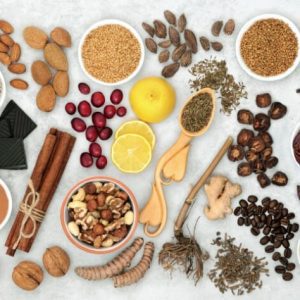What is Abyhanga?
Abyhanga is the practice of applying warm oil with gentle and methodical bodywork as a therapeutic art form of Ayurvedic medicine. The Dosha-specific warm herb-infused oil is rubbed onto the body to promote wellness, nourishing all tissues and quelling vata dosha. Abhyanga has the ability to calm the mind, spirit, and body in moments of vulnerability, like after childbirth. Even the translation of the word can make you feel hopeful for better days. The Sanskrit word for oil “Snehana” also means love. Abhyanga is considered to be one of the greatest acts of self-love.
What is an Abhyanga Session?
Your 1 hour Abhyanga bodywork is perfect for postpartum or for general wellness maintenance for all women. It includes stimulating and detoxifying the body by rubbing an herbal oil, specific to your Ayurvedic dosha, all over your body, including your scalp and hair.
Is Abhyanga a Massage?
An Abhyanga Session is unique bodywork, and it is not appropriate to call it a massage although it can be known an “oil massage” by Westerners. It is not truly a massage like most people are used to when going to get a massage for kinks and sore muscles. Abhyanga during postpartum includes stroking and gently rubbing and moistening to circulate energy and warm the body for faster healing.
Abyhanga for Postpartum
Abyhanga helps with grounding and quelling vata dosha after childbirth. Vata dosha (think airy, dry, and cold properties) is an energy in the body which increases during postpartum. For faster healing, we balance the three doshas (vata, kapha, and pitta) and practice healing methods to quiet vata dosha through warm and moist internal and external methods. This helps with circulation, keep wastes moving out of the tissues and body, allows for better relaxation, rejuvenation, and sleep! Abhyanga is like a replacement for exercise in the first few weeks, if you compare exercise to replenishing the body with newly circulated blood and healing to all organs and tissues. Oil bodywork decreases inflammation in the muscles and tissues and therefore stimulates lymphatic drainage and reduces pain after birthing. Abhyanga supports supports hormonal balance and even encourages healthy lactation through the lymph system being stimulated in an ultra-relaxing way.
The purpose of abhyanga is to bring vata dosha into balance, heal and rejuvenate the reproductive tissues (shukra dhatu), promote healthy breast and lactation channels (stanya vaha srota), and increase a positive and blissful state of the new mother’s mind and spirit. Abyhanga helps to ensure the new mother’s health is cared for and fosters easy bonding between mother and baby.
Abyhanga Postpartum Benefits
- Provides structured rest time for the mother while encouraging relaxation, deeper sleep, and more restful sleep patterns
- Increases circulation which reduces swelling and thus reduces pain
- Nourishes the body by removing toxins and by providing nutrients to tissues
- Imparts tone and vigor to the tissues of the body
- Vanishes “stuck blood” with new blood and removes fatigue
- Reduces stress and blocks from baby blues
- Soothe new aches from carrying & holding newborn around the clock (neck, arms, shoulders, and back)
- Prevents dryness and itchiness, enhancing skin health, making it lustrous, soft, and strong
- Produces softness, color, and strength in the body
- Warms the newly-cold (increased vata dosha) postpartum body
- Strengthens the immunity and vitality
- Calms the mind, the nervous system, and decreases anxiety
- Nurtures and supports emotions and positive feelings
- Stimulates lymphatic flow to rid excess fluids gained during pregnancy
- Increases lymphatic flow to support and increase healthy lactation
- Helps speed the removal of lochia (postpartum blood) and other discharge from the uterus
- Decreases the effects of aging and increases longevity
- Reduces coarseness, fatigue, numbness, roughness, and stiffness
- Maintains optimal body chemistry, including hormones and neurotransmitters
- Benefits local veins and ligaments plus helps sciatica
- Promotes healthy appetite and speeds metabolism, while balancing the elimination processes
- Encourages hope and happiness and a longing for, and determining a habit of self-care
Tips For Your Abhyanga Session
- Avoiding eating 45 minutes prior to your appointment
- Stay hydrated
- Don’t do your hair before coming in; oil is applied from scalp to toe so coming with unwashed hair is best
- Wear clothing you don’t mind getting residual oil on after leaving the clinic
- Expect to wash your hair and to either take a bath or shower when you return home after our session
- Prepare to sweat! Abhyanga takes place in a warm room to prevent excess air in the body, a quality of vata we want to quell.
- Please arrive promptly as the herbal postpartum oil will be warmed already waiting for you.
- To help you time your Abhyanga Session with your feeding schedule for your baby, here’s the timeline you can expect: 85 minutes total + drive time to & from the clinic (parking + elevator to clinic = 5min, using the restroom prior to the bodywork beforehand as it’s very detoxifying = 5 min, abyangha bodywork = 1 hr, cleaning off oil and dressing = 10 min, and possibly using the restroom after the bodywork = 5 min).
Abhyanga Contraindications
– Avoid abhyanga after eating or in cases of severe indigestion or constipation. As energy is moving from extremities to the heart through oiling massage, you are helping to correct and re-direct all five vayus, or movements of prana. Essentially, abhyanga has no discretion as to what it circulates, so not only can our blood flow be increased, but so can the movement of undigested food.*
– Avoid abhyanga when ama or conditions with excess kapha are present. Ama is considered to be undigested food, thoughts, or emotions that can accumulate and be present in a tangible (such as a coating on your tongue) or a non-tangible way (such as brain fog). When we speak of ama in the more measurable sense, it has an appearance or possesses qualities that are similar to the humors of kapha, or mucus. One of Ayurveda’s foundational principles is “like increases like,” so adding a heavy, unctuous material like oil could exacerbate conditions of increased kapha or high ama. In a worst-case scenario, massaging with oil could lodge ama deeper into tissues.*
– Avoid abhyanga during your menstrual cycle. Abhyanga stimulates a detoxification process in your body. Menstruation is a natural form of cleansing and it is recommended that women take extra rest during this time as adding further cleansing acts can create a weakened state of the body.*
– Avoid abhyanga while pregnant. Because abhyanga can stimulate detoxification, the fetus could become exposed to ama. That said, there is certainly a place for therapeutic touch and light massage during pregnancy – just not the practice of traditional abhyanga, which is quite vigorous and stimulating.*
– Avoid abhyanga after an emetic or basti. Emetics and bastis are forceful purgative acts: Emetics force movement up and out (udana vayu) and bastis down and out (apana vayu). Both are used to facilitate cleansing, though bastis are also administered to nourish the seat of vata with oil. Massage after purgatives can be counterproductive. Not only does massage work against an emetic or basti’s ability to prioritize a direction of movement, but it can also distribute throughout the body the very things that are trying to be forced out.*
*Resource: Bayan Botanicals
Payment Terms
You may pay electronically with a debit card, credit card, or HSA card. Secure ACH bank transfers are available on request.
Makes a great gift! If you’d like to give this to someone, please purchase via our Gift Card instead.
Compare Bodywork Packages
Purchase multiple abhyanga sessions in a Wellness Package and save up to $190.
Compare Postpartum Wellness Packages
Wellness Package
Wellness Package
Wellness Package



